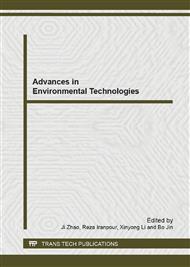p.2017
p.2022
p.2026
p.2030
p.2036
p.2040
p.2045
p.2051
p.2057
Thermocatalytic Degradation of Methylene Blue Using Negative Temperature Coefficient Resistor
Abstract:
Thermal degradation of organic pollutant was investigated in the presence of negative temperature coefficient resistor (NTC) under thermal treatments of 30°C, 35°C, 40°C and 45°C, respectively. Methylene blue (MB) was used as a model pollutant in this study. The degradation efficiency of MB in aqueous solutions were monitored by UV-vis spectrometry. Catalysts were allowed to adsorb MB to reach adsorption equilibrium before the degradation experiments were started. The results of degradation tests indicated that the best thermocatalytic ability was up to 41.68% in the concentration of 40 mg/L at 35°C within 30 h. Herein the feasibility of thermocatalytic elimination for organic contaminants with heat excitation was successfully demonstrated and the effectiveness of thermal catalyst adopted was also confirmed.
Info:
Periodical:
Pages:
2036-2039
Citation:
Online since:
August 2013
Authors:
Price:
Сopyright:
© 2013 Trans Tech Publications Ltd. All Rights Reserved
Share:
Citation:


